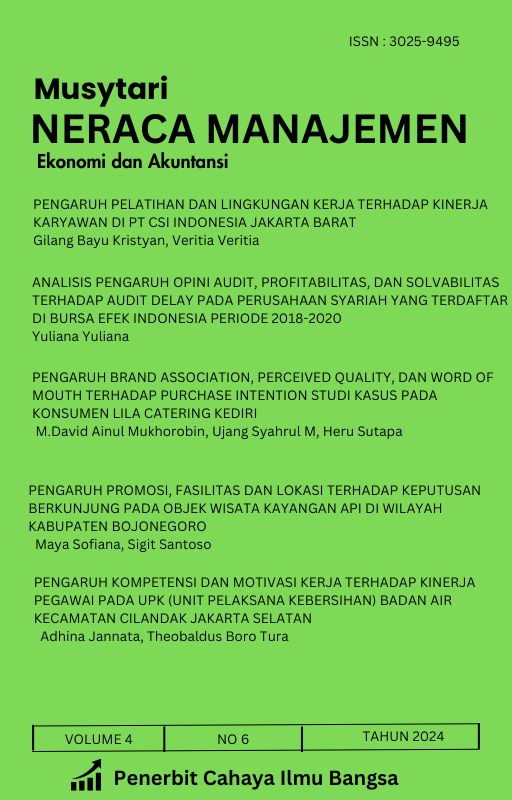THE IMPACT OF ENVIRONMENTAL, SOCIAL, GOVERNANCE (ESG) SCORE AND SELF-ASSESSMENT GCG ON FINANCIAL PERFORMANCE WITH CREDIT RISK AS A MODERATING VARIABLE IN BANKING COMPANIES LISTED ON THE INDONESIA STOCK EXCHANGE FOR THE PERIOD 2019-2023
Published 2025-06-12
Keywords
- Financial Performance,
- Environmental,
- Social,
- Governance (ESG) Score,
- Self-Assessment GCG
- Credit Risk ...More
How to Cite
Abstract
This study aims to analyze the influence of Good Corporate Governance (GCG) and Environmental, Social, and Governance (ESG) on the financial performance of banking companies listed on the Indonesia Stock Exchange, considering the role of credit risk as a moderation variable. Financial performance is measured using the Return on Assets (ROA) indicator as a representation of the company's profitability. This study uses a quantitative approach with secondary data obtained from annual reports, GCG self-assessment reports, and ESG data from Bloomberg for the period 2019 to 2023. The sample consisted of 18 banking companies selected through the purposive sampling method based on certain criteria. The analysis technique used was panel data regression with moderation, which was processed using Eviews 12 software. The results showed that GCG Self-Assessment and credit risk had a significant influence on ROA, while ESG did not show a significant influence on financial performance. In addition, credit risk has been shown to moderate the relationship between GCG and financial performance, but it does not have a moderation role in the relationship between ESG and ROA. These findings emphasize the importance of strengthening good corporate governance and effective credit risk management to drive improved banking financial performance. Although ESG has not had a significant direct impact on profitability, sustainability practices still need to be maintained to meet stakeholder demands and improve the company's reputation and competitiveness in the long term.
References
- Akbar, F., & Fahmi, I. (2020). The effect of company size, profitability and liquidity on dividend policy and company value in manufacturing companies listed on the Indonesian stock exchange. Scientific Journal of Management Economics Students, 5(1), 62–81.
- Aliyani, A. D., & Hadiprajitno, P. T. B. (2023). The Influence of Corporate Social Responsibility, Corporate Governance, and Company Characteristics on Tax Avoidance (Empirical Study on Manufacturing Companies Listed on the Indonesia Stock Exchange in 2017-2021). Diponegoro Journal of Accounting, 12(3).
- Andrianto, A., & Firmansyah, M. A. (2019). Sharia Bank Management: Implementation of Theory and Practice. Qiara Media Pustaka.
- Eccles, R. G., Lee, L.-E., & Stroehle, J. C. (2020). The social origins of ESG: An analysis of Innovest and KLD. Organization & Environment, 33(4),
- Eccles, R. G., Lee, L.-E., & Stroehle, J. C. (2020b). The social origins of ESG: An analysis of Innovest and KLD. Organization & Environment, 33(4), 575–596.
- Hutabarat, F. (2021). Analysis of the company's financial performance. Desanta Publisher.
- Karina, R., Lestari, F., & Ivone, I. (2023). The Effect of Enterprise Risk Management on Financial Performance and Firm Value: The Role of Environmental, Social and Governance Performance. Global Financial Accounting Journal, 7(2), 213–229.
- Miharja, I. S., Sormin, S. H., & Graduation, W. (2023). Gender Diversity Analysis on Financial Performance and Company Values with Environmental, Social, Governance (ESG) as Moderating Variables. Sebatik, 27(2), 499–508.

